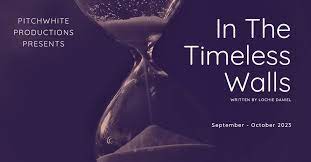TASA welcomes PitchWhite Productions to the South Australian theatre community with their inaugural production of “In The Timeless Walls” written and directed by Lochie Daniel.
“In The Timeless Walls” is a psychological drama, but it’s not so much about the psychology of the characters in the play itself. It’s more about how audience members individually process what they see and hear on stage and construct their own understanding in the apparent absence of any meaning prescribed by the playwright. Does it sound like a challenging piece of theatre? Well, it is.
This is Daniel’s first foray into the fraught business of becoming a playwright, and with so many ‘firsts’ associated with the production, the results were respectable. There is no doubting the passion and enthusiasm of this young company, and they have intelligently gone about the business of bringing the script from page to stage with much care and thought. Although unassuming in execution, the various production elements – costuming, lighting, choreography, sound, set, stage effects – all reflect thoughtful design and combine to produce an on-stage world that is purposeful and internally coherent. The lighting and sound are especially well done. The cast of five generally turn in pleasing performances, which are peppered with moments of almost unnerving intensity.
However, there is a problem that lurks throughout the production, and it is lack of clarity in the narrative, at least from the perspective of an audience member who sees the show without any forewarning or preconceived notions. As clever as the script might be, it struggles to become compelling.
The advertising for the production explains that the plot centres around five people who suddenly wake up and find themselves trapped in a room from which the means of escape are not obvious. They are strangers to each other and quickly face up to the fact that they won’t be going anywhere soon. As the realization of their situation unfolds, they become angry and defensive with each other, but inevitably start to get to know each other. The play has an obscure ending, and the advertising tells us ‘the room’ isn’t what it seems. In his Director’s Note, Lochie Daniel explains the “…show is a difficult concept to express on stage”, that it “…incorporates ideas and themes that are not specified within the dialogue, but are more visually represented…”, and that “everything ties back to the one major point … that once understood opens a whole new gateway to understanding not only the story presented on stage, but who we are as humans and what the brain is capable of.”
Pheww!!! This almost sounds like a warning: be prepared to be challenged, and if that is what the director and company wanted, that’s what they got. At the end, as the audience filed out of the auditorium, one person was overheard to say that it was like watching the film ‘The Sixth Sense’. This was an example of someone whose natural inclination was to try and find a structure they could use to make sense of what they had just seen. Seizing on the pyscho-thriller The Sixth Sense was very apt, or so it seemed to this reviewer. Perhaps this is what the playwright wanted: everyone to create their own meaning? But, what about the “one major point” that Daniel talks about? Has it been sacrificed at the altar of obscurity? This reviewer fears so.
The play is written as a true ensemble piece: every character is equally important, and the internal consistency of the show depends on equally strong performances. The production succeeded in this respect. Genevieve Hudson (in the role of ‘Winter’) used her body and the stage well, and trod a careful line between fear, resignation, and renewal, as she exposed family secrets. Tianna Cooper gave ‘Margo’ an immediate sense of weakness expressed through a thinly disguised veil of aggressiveness. The contrasts were enjoyable to watch as they unfolded. Gwydion Rozitisolds played ‘Finn’ with a sense of calm and maturity. Their character was the sense of reason and logic the other characters hated but secretly yearned for, as did the audience. On occasion, Rozitisolds’ diction and rapidity of speech made it difficult to fully comprehend what Finn was saying. Olivia Tod played the role of paraplegic ‘Maisie’ and gave her a compelling blend of vulnerability, helplessness, but also an assuredness of self. Interestingly, at the end of the play it is Tod who takes a prominent upstage position and beautifully sings a song that attempts to draw the threads of the play together, as a sort of benediction. Rounding out the cast is Jarrod Matulick who plays ‘Jasper’ with great sincerity and gives perhaps the best performance of all. Matulick’s portrayal of extreme anxiety and fear had the potential to become over wrought, but it was anything but. (Matulick also composed the soundscape for the production, which was the better for it.)
So, what do we take from this production? For this reviewer, we see the emergence of a young and original group that is not afraid of making difficult theatre that challenges traditional views of what should be seen on stage. PitchWhite Productions, and its founder Lochie Daniel, are daring, brave, and have something to say. This reviewer warns them against favouring obscurity in future productions lest their audience wearies of their own psychology being diced and sliced!



